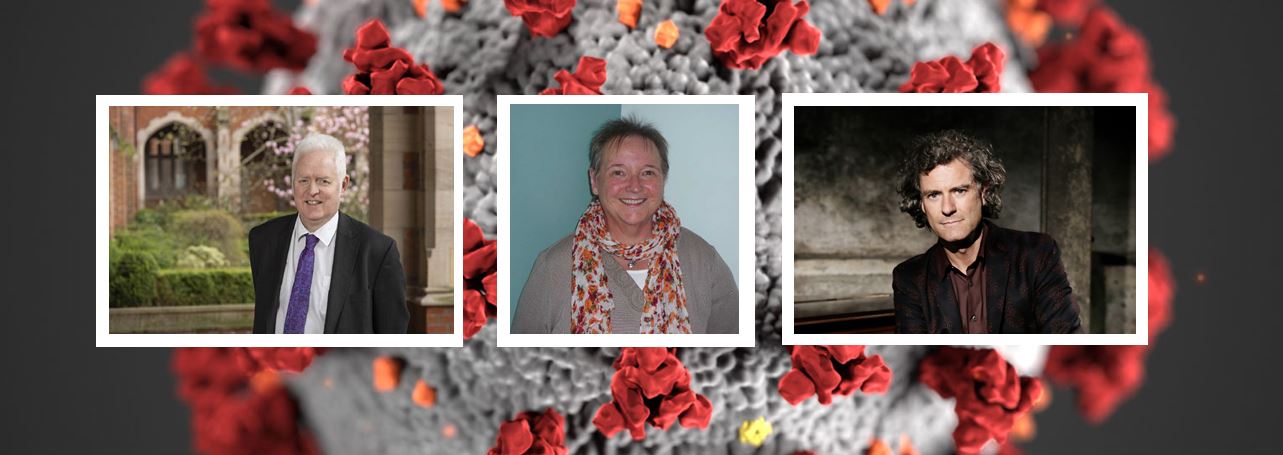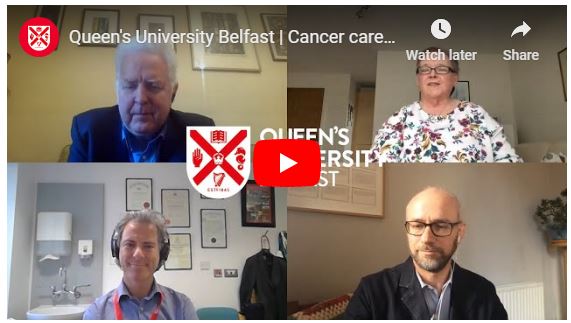PODCAST CONSIDERS CANCER CARE IN THE ERA OF COVID-19
13 May 2020
Experts at Queen’s, including a number of cancer specialists who have been making a major contribution to research on the impact of COVID-19, have come together to discuss the impact of the coronavirus on cancer care.
An opinion piece, published recently in the European Journal of Cancer involving researchers at Queens, the University of Split, Croatia and King’s College London has highlighted that the response to the outbreak of the coronavirus disease 2019 (COVID-19) is significantly affecting the health and wellbeing of patients with cancer.
Backing up this assertion, Queen’s researchers, in collaboration with University College London and fellow colleagues in DATA-CAN, the UK’s Health Data Research Hub for Cancer, have just completed a major study which they have posted online.
The study shows how diagnostic referrals and treatment appointments have dropped significantly during the COVID-19 pandemic, which they predict may lead to 18,000 excess deaths in patients with cancer.
Cancer is a common disease, with over 3.7 million new diagnoses in Europe each year and over 1.9 million deaths. The research highlighted how the repurposing of the health systems and implantation of social distancing measures has had a negative effect on patients with cancer.
With urgent referrals dropping, surgical procedures being postponed and cancer specialists being redirected to COVID-19 specific care, there is a risk of a future cancer epidemic.
Cancer and COVID-19 Panel Discussion
In this panel discussion, Mr Maurice Macartney, Community Impact Officer, is joined by two leading cancer specialists from Queen’s, Professor Mark Lawler and Professor Joe O’Sullivan, and pioneering patient’s advocacy campaigner Mrs Margaret Grayson MBE to discuss the impact of COVID-19 on cancer care.

These thought leaders discuss their views based on their expert knowledge and perspective within research, the clinical setting and being a patient in the health system during this current pandemic. In their online discussion, the panel will highlight key issues related to Cancer and COVID-19 including:
- The importance of access to real data and its application to cancer policy in order to develop solutions to reduce the predicted excess mortalities
- Consequences of late presentation of cancers
- Patient fear when considering accessing services and regaining the confidence of the public in a health setting
- Providing appropriate resources for cancer services to be delivered at pre covid-19 levels
Meet the Panel
Professor Mark Lawler of the Patrick G Johnston Centre for Cancer Research is Associate Pro Vice-Chancellor and Professor of Digital Health in Queen’s. He is a leading figure in European cancer research, having led the development of the European Cancer Patients’ Bill of Rights, and having been a driver of the All-Ireland Cancer Consortium, founded in the wake of the Belfast or Good Friday Agreement.
He is also Scientific Lead in DATA-CAN, the UK Health Data Research Hub for Cancer
Professor Joe O’Sullivan is Clinical Professor in the School of Medicine, Dentistry and Biomedical Sciences at Queen’s.
Throughout his academic medical career, Professor O’Sullivan has been committed to improving the lives of patients with prostate cancer through research and innovation. He has established the clinical research programme in prostate cancer which is now recognised as a Centre of Excellence and led a major technological development programme in radiation oncology.
As one the 4 Directors of the FASTMAN Prostate Cancer Centre of Excellence (Belfast and Manchester) Joe has focussed on development of novel approaches to the treatment of potentially fatal prostate cancer using radiation.
Mrs Margaret Grayson is a retired radiographer and a patient living with cancer who, since 2010, has become a prominent and effective patient advocate in the area of cancer care. Mrs Grayson is chair of the Northern Ireland Cancer Research Consumer Forum and works with Cancer Research UK as a patient advisor on their Grand Challenge research projects.
She is also on the steering committee of DATA-CAN as a patient and public involvement and engagement representative. In 2018, Mrs Grayson was awarded an MBE for her services to cancer research.
Further information on additional research and analysis carried out at Queen's University Belfast in response to the COVID-19 coronavirus, can be found at: https://www.qub.ac.uk/coronavirus/. If you would like to support the University in its efforts to tackle the COVID-19 pandemic, click here.
To support health-related research projects at Queen’s University, visit the Development and Alumni Relations Office website or contact Teresa Sloan, Head of Health Fundraising. Medical queries arising out of this news story should be raised directly with a GP/consultant and not with DARO staff.
For general enquiries about this story or to submit a graduate news item, please contact Gerry Power, Communications Officer, Development and Alumni Relations Office (DARO), Queen’s University Belfast.
Back to Main News
Top of Page